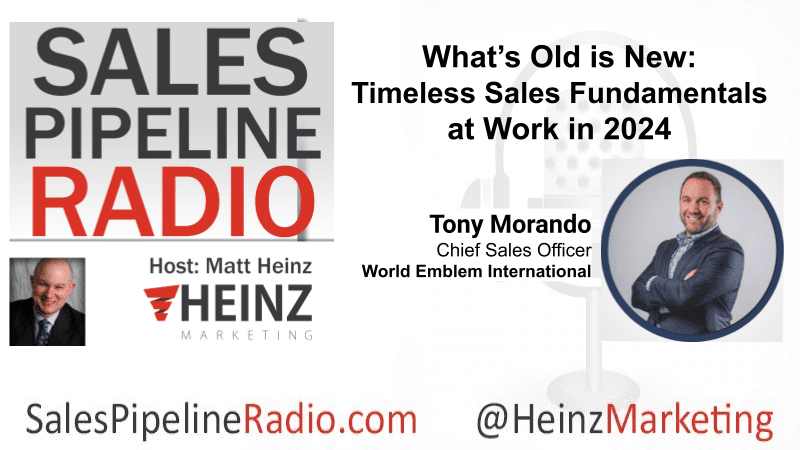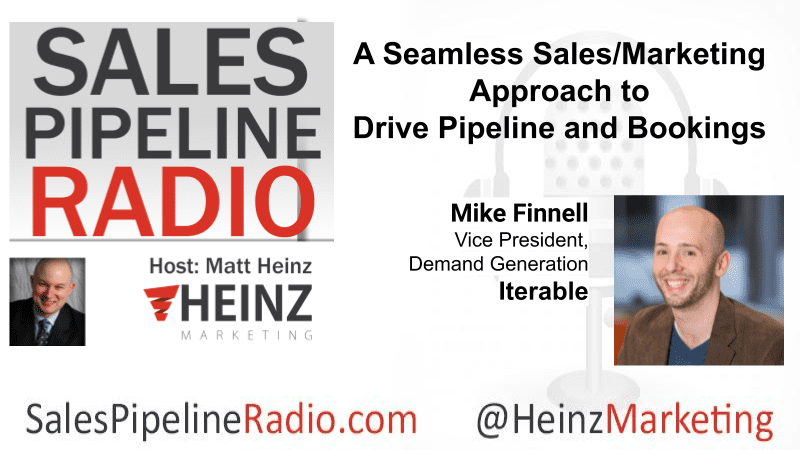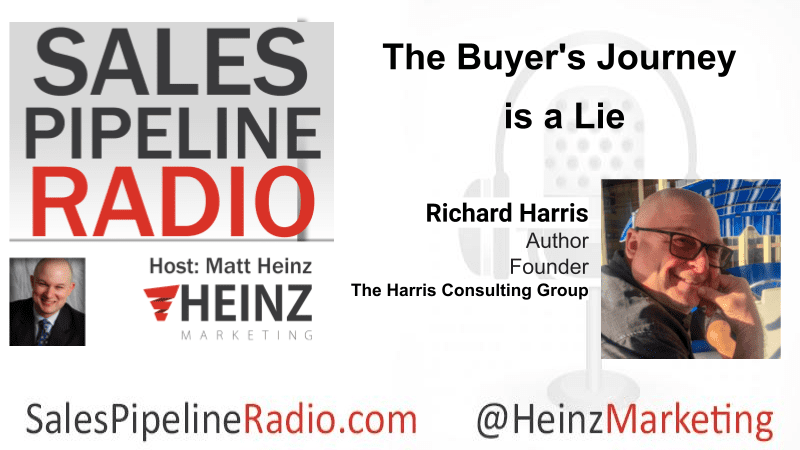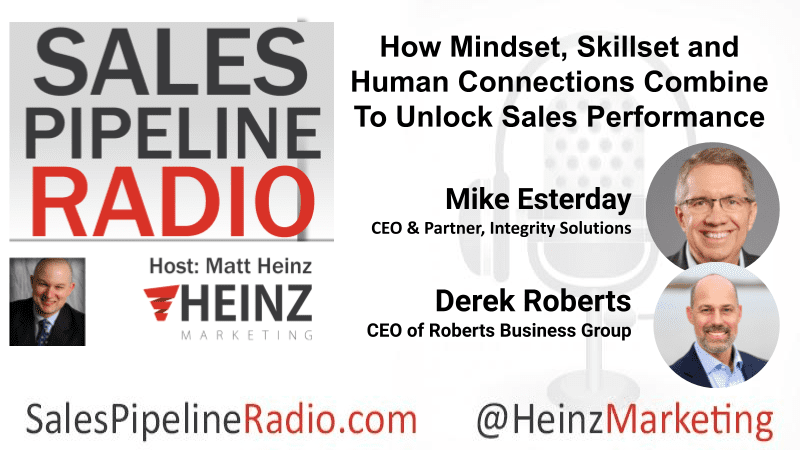Sales Pipeline Radio, Episode 357: Q & A with Tony Morando

Summary
Matt interviews the best and brightest minds in sales and Marketing on Sales Pipeline Radio.
By Matt Heinz, President of Heinz Marketing
If you’re not already subscribed to Sales Pipeline Radio or listening live Thursdays at 11:30 am PT on LinkedIn (also on demand) you can find the transcription and recording here on the blog every Monday morning. The show is less than 30 minutes, fast-paced and full of actionable advice, best practices and more for B2B sales and marketing professionals.
We cover a wide range of topics, with a focus on sales development and inside sales priorities.
This week’s show is entitled, “What’s Old is New: Timeless Sales Fundamentals at Work in 2024“ and my guest is Tony Morando, Chief Sales Officer at World Emblem International.
Tune in to Learn About:
- The importance of longevity and culture in a company
- Building trust and relationships in sales
- The value of being coachable and learning from mistakes
- Handling rejection professionally and how it relates to building future pipeline
Watch the video, listen in below and/or read the transcript below.
Matt: Welcome everybody to another episode of Sales Pipeline Radio. I am your host, Matt Heinz. So excited to have you here.
Thank you for downloading and subscribing. Every episode of Sales Pipeline Radio, always available at www.salespipelineradio.com
very excited today to have with us the Chief Sales Officer for World Emblem, Tony Morando. Tony, thanks for joining us today.
Tony: Thanks, Matt. Pleasure to be here.
Matt: We feature a number of sales authors, subject matter experts, talking to a lot of marketers about what they’re doing. I love having folks like yourself on that can just share your knowledge of what you have learned over a life of sales.
What works, what doesn’t work, everything from best practices to dumpster fires and cautionary tales. If you could just quick introduce yourself, like who you are and where you’re from.
Tony: Yeah, awesome. My name is Tony Morando. You nailed it right off the bat, the Chief Sales Officer, World Emblem originally from Boston, Massachusetts.
Grew up in Boston, went to school in Boston, post college. I got transferred out to San Diego, California. And I’ve been out in San Diego now for the past 19 years heavily involved in the apparel decoration space. I’ve spent literally the past 19 years working my career from a outside sales rep up to CSO.
So it’s been a whirlwind of success, adventures, and learning experiences.
Matt: That’s awesome. So you recently celebrated 17 years at World Emblem. In today’s day and age, that is an incredible amount of time. Talk about the value of longevity in a role in really diving deep.
And then I want to talk about career progression as well, from where you started to where you are today.
Tony: Yeah, it’s funny. You’re the second person that found it odd to be with the company 17 years. So it seems like that’s not the norm these days, but I think there is a lot to be said; even when I look at my team, our tenure is about nine years.
So the reps that have come aboard have stayed. And honestly, it is extremely impactful for the fact that one, it really kind of develops and builds the culture that we’re trying to establish within the business. And that starts top down. So our CEO has done an unbelievably fantastic job of making sure that that culture runs from our executive team, all the way to our entry level folks.
And particularly when we hire, that is the number one thing we hire to is cultural fit. Like we want to make sure that whoever we bring on board is going to fit you know, the World Emblem way. And also I think it helps with the continuous learning, right? So the tenure really kind of feeds off off of everybody.
Everybody gets to learn something. Everybody’s willing to share. And we’re able to drive kind of that best practice principle because of it.
Matt: Well, it’s rare, but I think it’s wonderful, right? I mean, it speaks to not only a great company and a great culture, but a great opportunity. And, you just look at LinkedIn and where you have evolved just in the last 17 years from, like you said, like, you know, having a territory to now running all those sales, talk about like the value of doing that in a company that you believe in versus a lot of people will hop around at different places and have those different roles. There’s pros and cons to that, but I think being able to do that in one place and help, not just appreciate and benefit from the culture, but really be and enable and build the culture as part of the role.
Tony: Yeah, I mean, honestly, I think there’s a couple couple different ways to look at this. So I think it was like a stock market, right? Everybody wants to get a quick win. They want to make some money and get out. And for me, it’s been just kind of the opposite. I like the long play. I like to learn kind of every different level within the organization.
And you know, it’s, it’s been wild. So the first couple of years coming on board, I was brought out to open up a new market, which was the West coast for us. We had zero presence. We didn’t have any manufacturing out here. I think we had one client at the time in kind of the mountain group, which is Salt Lake City or Denver.
And honestly it took some time. There was a lot of learning. You know, we learned a lot from our mistakes which has been part of the reason why I think I’ve had the success I have because you’re going to make mistakes. I think a lot of times people quit too early, and they don’t have the opportunity to move up within the business because they want to get that quick win.
They get offered another position where maybe they get a little more salary. But for me, it’s been about, you know, pay your dues, learning the business, learning the products, building the relationships. And that’s kind of led to step-by-step growth over the past 17 years.
Matt: It’s awesome. We’re talking today on Sales Pipeline Radio with Tony Morando, he’s the Chief Sales Officer at World Emblem. And I want to talk about the importance of really getting to know your customer, your industry. And I want to use an example from your past. You spent three, almost four years as VP of sales in the industrial laundry division. And I’m guessing there’s a lot of people listening to here that don’t really know the industrial laundry industry. So as an example of what it takes to get to know your industry and to customize a selling solution, can you talk a little bit about what the hell is industrial laundry and how can you use that as a case study for more personalized, customized selling?
Tony: Yeah, so industrial laundry geez, I’ll try to make the simplest way to explain it. You know, you go to a gas station and you see somebody wearing a uniform with a name tag, Tony, Bob, and it says the name of the company on the side. Our company manufactures all those name badges. Whether it be imported, sublimated, we sell them back into the industrial laundry world, which, I won’t mention the names, but there’s some very large fortune 500 companies out there.
And they service everybody from food industry to healthcare, auto, manufacturing, union, everything in between. So it is a very unique industry where they basically provide uniforms for manufacturing companies so they don’t have to bring home their own personal clothes and get them dirty and then they rotate them every week.
They basically pick up the dirties and drop off brand new uniforms to their customers. Now selling into the industry, it’s really unique because you’re not selling to a specific buyer. You’re selling to multiple buyers within each individual location. So as an example, let’s just use the state of California. I could have a hundred different locations out here and each location may have anywhere from four to 10 buyers at the location.
You need to get the trust of each buyer to be able to win that business. So we’re pretty methodological in terms of how we approach this. We’ve developed systems internally that basically guide our reps who to contact, what conversations to have, what to listen for, how to react to it. And then we’ve used that to kind of share that experience amongst the rest of the team. So everybody again, goes back to that shared best practices, shared learning. It’s a much different industry than some of the others, that I’ve talked to with some friends that are selling into, medical devices or technology, this one really is based on developing hardcore relationships and earning the trust of multiple buyers.
Matt: Love that. There is a commonality between what. someone that may be in the tech space and what you just described is this concept of the buying committee, right? The multiple people in the organization, different buyers that may have different needs, different perspectives, different approaches.
Building a relationship is super important, but, Rolodex is a limit if you can’t connect on the need, right? So can you talk a little bit about having a relationship, building trust, and then there’s understanding a need that the prospect may or may not understand themselves, right?
Like I think of this in terms of sort of need signals and evidence of need signals. How do you help connect the dots and be that trusted advisor as part of the role to build the trust, but then to build consensus amongst those multiple buyers?
Tony: Excellent question. So we talked about kind of some of the best practices just previously, but also I think it’s being able to solve problems. So outside of just a cultural fit, that we hire to, we also look for people that are able to solve problems. And we incorporate that into our interviews just to see how the mind works and how the individual can respond to certain scenarios. The way that we’ve seen at least the success on our side of work is those who are able to solve the problems for the buyers, not just pushing product, not pushing what we want the buyer to actually take, but more so what we can help them fix and make better has delivered a better long-term relationship.
And this goes back to early days. I’ve made other shifts with some of these clients that, 17 years later, we’re friends outside of work. We talk continuously on the weekends. And honestly, it’s because we’ve delivered the value. We brought something. We’ve helped identify what the true issue was.
We solved it with one of our solutions. And I think that is the quickest way to build trust and respect within any group you’re selling to.
Matt: So we get a good mix of sales and marketing folks that will listen to and watch the show. So I’m curious for you as a sales leader, what would you say to marketing leaders listening?
Like what’s the best way to not just support, but really to partner with sales to drive revenue objectives?
Tony: Yeah, I think it would really be to understand what the pain points are. What are the sales reps experiencing when they’re meeting with prospects? What are they hearing? What have they done in the past that have worked?
We always talk about how often our marketing team should be campaigning and contacting our prospects and customers, and that’s something that I think has to be continually evolving. We’re seeing it now with some of the technology coming out, AI, and I’ve had a lot of conversations with different leaders about how AI is influencing the sales industry and impacting the marketing side. And honestly, I think it’s just a continually evolving door, right? You got to make sure that you are listening and making adjustments based on what you’re seeing.
Matt: Let’s say you have an audience with someone who’s new in their career in sales, starting from scratch, what’s advice that you would give them? What’s something you wish you would have known or wish you would have done earlier in your sales career?
Tony: Couple different things. One is be coachable. I think there’s a lot of younger generation sales folks that are starting out that …nobody knows it all.
Right? And I think that’s a great saying. Nobody knows everything. If you know everything, then you’re in the wrong business because I think you need to come in with an open mind that you’re going to make mistakes. You’re not going to know everything. There are people that have been there a long time.
You know, we talked about tenure. There’s a reason why people have been successful to last that long. And most of them have done it because they’ve been coachable. They’ve been open to feedback. They’ve been willing to listen and learn. So to me, being coachable is definitely the most important for any new sales rep to come in and also to understand you’re going to make mistakes. You’re going to fail. And that’s part of the process. And that’s also something that pushes people out the door pretty quickly. Somebody fails and they get discouraged and they go right away looking for the next best thing. So just be willing to make mistakes, be willing to be coached and learn and get better every day.
Matt: If you’re in sales, you got to be like a baseball hitter, right? You’re a hall of fame batter if you fail 7 out of 10 times. And in sales, we celebrate the wins and ring the bell and this is great, but behind every win is countless losses.
It’s doors closed in your face. It’s phones not answered. It’s hot prospects that ghost you. And so I think there’s a level of tenacity that goes along with that as well in any role, but I think especially in sales, do you find that that is a learned skill to be able to have that resilience in selling?
Tony: It is for sure. When we first started, I used to take it so personally every time I get rejected or every time I get the phone hung up on me. I was telling somebody the other day that a quote that I heard Gordon Ramsey saying it stuck with me: “Take it professionally, not personally”. And that is so on the spot when we talk about sales, because people really take it personally and their feelings get hurt and then they tend to shut down. But if you learn, look, just because somebody saying no. Doesn’t mean no forever. It just means no today, right?
Obviously there’s more work that has to be done. So the biggest advice would be, take it professionally, not personally. And a no isn’t something that you should you should shut the door for.
Matt: I agree with that. We so even inside of our own business, we have two different stages of closed loss.
One is closed loss, meaning we lost them to a competitor. But the majority of the time a business is lost to what we call closed nurture. It means theyhad a different priority. They had something else that came up. They decided not to invest in right now, whether or not we were able to communicate the value of what we were offering different.
But every time you have those conversations, you’re planting seeds for the future, right? And the way that you treat and the way you handle that conversation with professionalism, with care to build trust… yeah, you want that deal to close now. Yeah, you want to hit your number this month, this quarter, whatever, but you are building future pipeline with the majority of the no’s that you get is– in 15 years of running my own business, before this I was lifelong marketer, but inherently when you own your own business, you’re carrying a bag the whole time. And I’ve learned that a no, to your point, is a potential pipeline, a potential yes down the road.
Tony: Well, a hundred percent, a hundred percent.
Matt: Yeah. Awesome. Well Tony, thank you so much for joining us today. Tony Morando, Chief Sales Officer at World Emblem. Just really appreciate your time and insights. Thank you everyone so much for listening and watching. We’ll be back next week. Another episode of Sales Pipeline Radio. Until then, take care.
Tony: Thanks, Matt.
Listen to the Latest Episodes:
Matt interviews the best and brightest minds in sales and Marketing. If you would like to be a guest on Sales Pipeline Radio send an email to Sheena@heinzmarketing.com.
Sales Pipeline Radio was recently listed as a 30 Best Sales Management Podcasts
You can subscribe right at Sales Pipeline Radio and/or listen to full recordings of past shows everywhere you listen to podcasts! Spotify, iTunes, Blubrry, Google Play, iHeartRADIO, Stitcher and now on Amazon music. You can even ask Siri, Alexa and Google or search on Audible!



